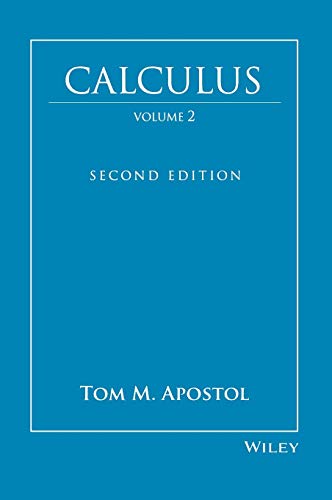 Reddit reviews Calculus, Vol. 2: Multi-Variable Calculus and Linear Algebra with Applications to Differential Equations and Probability
Reddit reviews Calculus, Vol. 2: Multi-Variable Calculus and Linear Algebra with Applications to Differential Equations and Probability
We found 6 Reddit comments about Calculus, Vol. 2: Multi-Variable Calculus and Linear Algebra with Applications to Differential Equations and Probability. Here are the top ones, ranked by their Reddit score.

Start With "Foundations Of Analysis" By Edmund Landau
http://www.amazon.com/Foundations-Analysis-AMS-Chelsea-Publishing/dp/082182693X
It's a tiny book, but is very good at explaining basic abstract algebra.
Here is the description from Amazon:
"Why does $2 \times 2 = 4$? What are fractions? Imaginary numbers? Why do the laws of algebra hold? And how do we prove these laws? What are the properties of the numbers on which the Differential and Integral Calculus is based? In other words, What are numbers? And why do they have the properties we attribute to them? Thanks to the genius of Dedekind, Cantor, Peano, Frege and Russell, such questions can now be given a satisfactory answer. This English translation of Landau's famous Grundlagen der Analysis-also available from the AMS-answers these important questions."
With the above book you should then have enough knowledge to move on to calculus.
I recommend the two volume series called "Calculus" by Tom M. Apostol.
The first volume is single variable calculus and the second is multivariate calculus
http://www.amazon.com/Calculus-Vol-One-Variable-Introduction-Algebra/dp/0471000051/ref=sr_1_4?ie=UTF8&s=books&qid=1239384587&sr=1-4
http://www.amazon.com/Calculus-Vol-Multi-Variable-Algebra-Applications/dp/0471000078/ref=sr_1_3?ie=UTF8&s=books&qid=1239384587&sr=1-3
This is a compilation of what I gathered from reading on the internet about self-learning higher maths, I haven't come close to reading all this books or watching all this lectures, still I hope it helps you.
General Stuff:
The books here deal with large parts of mathematics and are good to guide you through it all, but I recommend supplementing them with other books.
Linear Algebra: An extremelly versatile branch of Mathematics that can be applied to almost anything, also the first "real math" class in most universities.
Calculus: The first mathematics course in most Colleges, deals with how functions change and has many applications, besides it's a doorway to Analysis.
Real Analysis: More formalized calculus and math in general, one of the building blocks of modern mathematics.
Abstract Algebra: One of the most important, and in my opinion fun, subjects in mathematics. Deals with algebraic structures, which are roughly sets with operations and properties of this operations.
There are many other beautiful fields in math full of online resources, like Number Theory and Combinatorics, that I would like to put recommendations here, but it is quite late where I live and I learned those in weirder ways (through olympiad classes and problems), so I don't think I can help you with them, still you should do some research on this sub to get good recommendations on this topics and use the General books as guides.
That's nothing. At least you are comparing different books, so maybe the new, expensive one benefits from something that has changed since 1960.
Look at this: Apostol, "Calculus", Volume 2. A brand new copy of the current edition in hardback is $270. That's the 2nd edition.
That book was about $20 when I bought a hardback copy in 1976 at Caltech. Guess what edition we were using? The 2nd edition, from 1969.
Same story with volume I. The nearly $300 edition they sell new today is the 1967 2nd edition. (Some sites list it as 1991, but it's still just the 1967 2nd edition text).
Calculus Volume 2 - Apostol.
To the nay-sayers, I'll offer a contrary opinion: It is doable. Especially if you do linear algebra and multivariable calculus at the same time, since a lot of the underlying ideas and techniques are the same. It will, however, take focus.
I am by no means a mathematical genius, but with consistent, daily studying, I was able to take calc III and linear algebra in the same 5 weeks, and differential equations in the regular semester following that. By prepared to work hard, do lots of problems, and carefully dissect new ideas as they are presented, but it can be done.
EDIT:
In fact, I'd like to recommend a superb textbook that covers all three of these topics:
http://www.amazon.com/Calculus-Vol-Multi-Variable-Applications-Differential/dp/0471000078
If you're interested in self-study, it's often difficult when different textbook authors use different notation, or different but practically equivalent definitions and methods. Not only does this avoid that problem, but it's an extremely lucid and thorough book, with lots of exercises, and you can keep it for the rest of your career for reference.
For the quick, dirty, introduction, and desktop reference I love my copy of Div, Grad Curl and all that to death.
For an in-depth, proof-based version of multivariable calculus, I like Apostol's Calculus, Vol. II. It's dense like a brick, so maybe not the best cramming material, but it's certainly complete.